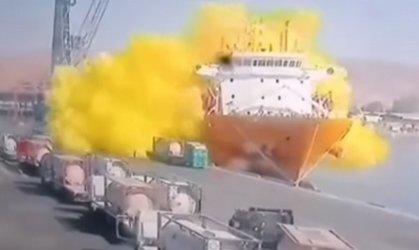D
Deleted member 149562
Guest
We in fishkeeping already know how dangerous chlorine can be to our fish.
The substance is a widely used additive to our water supplies, swimming pools as a disinfectant and water purification...we accept it as something that is used normally almost everywhere.
Many of us tend not to realise exactly how dangerous chlorine can be.....that is until incidents like an accidental spill in a swimming pool hits the headlines. But even then many people do not truly understand just how toxic chlorine actually is and the damage it can do to the body....whether that body is an animal or human.
Yesterday in Jordan and even bigger tragedy involving chlorine happened. A very large pressurised tank containing 25 tons of chlorine gas fell from a crane whilst being loaded onto a ship. As you will see from the footage contained in this link, what followed was both extraordinary and tragic, both for those caught close by and for the seawater around the ship itself. When the gas is inhaled, it turns to hydrochloric acid and destroys the lungs. As a result of the accident over 10 have died and more than 250 suffered serious injuries.

 www.fleetmon.com
www.fleetmon.com

The substance is a widely used additive to our water supplies, swimming pools as a disinfectant and water purification...we accept it as something that is used normally almost everywhere.
Many of us tend not to realise exactly how dangerous chlorine can be.....that is until incidents like an accidental spill in a swimming pool hits the headlines. But even then many people do not truly understand just how toxic chlorine actually is and the damage it can do to the body....whether that body is an animal or human.
Yesterday in Jordan and even bigger tragedy involving chlorine happened. A very large pressurised tank containing 25 tons of chlorine gas fell from a crane whilst being loaded onto a ship. As you will see from the footage contained in this link, what followed was both extraordinary and tragic, both for those caught close by and for the seawater around the ship itself. When the gas is inhaled, it turns to hydrochloric acid and destroys the lungs. As a result of the accident over 10 have died and more than 250 suffered serious injuries.

Chlorine gas tank fell on Chinese cargo ship, 10 dead 251 injured, Jordan VIDEO
Tank with 25 tons of chlorine gas fell onto cargo deck of brand-new deck cargo ship FOREST 6 at Aqaba Port, Jordan, ...


